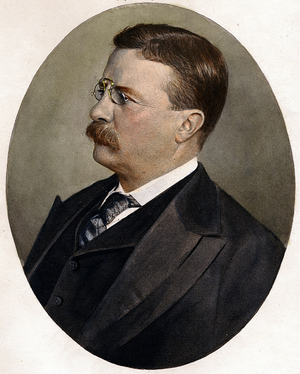Pure Food and Drug Act
From Rx-wiki
The original Pure Food and Drug Act (also known as the Wiley Act) was passed by Congress on June 30, 1906 and signed by President Theodore Roosevelt. It prohibited interstate commerce in misbranded and adulterated foods, drinks and drugs under penalty of seizure of the questionable products and/or prosecution of the responsible parties.
To define a couple of terms, to misbrand something means to brand or label misleadingly or fraudulently; while, adulterated means to make impure by adding improper or inferior ingredients.
The Meat Inspection Act was also passed the same day.
Shocking disclosures of insanitary conditions in meat-packing plants, the use of poisonous preservatives and dyes in foods, and cure-all claims for worthless and dangerous patent medicines were the major problems (brought to the public's attention via journalists known as muckrakers) leading to the enactment of these laws. Two of the most famous muckrakers were a journalist named Samuel Hopkins Adams (whom wrote a series of eleven articles for Collier's Weekly, called “The Great American Fraud”) and an author and social activist named Upton Sinclair (whom wrote “The Jungle”)
The following are some important court cases involving the Pure Food and Drug Act:
- In 1911, the U.S. v. Johnson, the Supreme Court ruled that the 1906 Food and Drugs Act does not prohibit false therapeutic claims but only false and misleading statements about the ingredients or identity of a drug.
- In 1912, in reaction to the U.S. v. Johnson verdict, Congress enacted the Shirley Amendment to over come the ruling in U.S. v. Johnson. It prohibited labeling medicines with false therapeutic claims intended to defraud the purchaser, a standard difficult to prove.
- In 1924 in U.S. v. 95 Barrels Alleged Apple Cider Vinegar, the Supreme Court ruled that the Food and Drugs Act condemns every statement, design, or device on a product's label that may mislead or deceive, even if technically true. This case helped to verify the Pure Food and Drug Act's enforceability for dealing with misbranded and adulterated products.
This act is often considered the beginning of the FDA.
See also
Federal pharmacy law
Food and Drug Administration
References
- Pharmacy Times, A Review of Federal Legislation Affecting Pharmacy Practice, Virgil Van Dusen , RPh, JD and Alan R. Spies , RPh, MBA, JD, PhD, https://secure.pharmacytimes.com/lessons/200612-01.asp
- Strauss's Federal Drug Laws and Examination Review, Fifth Edition (revised), Steven Strauss, CRC Press, 2000
- Food and Drug Administration, Legislation, http://www.fda.gov/RegulatoryInformation/Legislation/default.htm
- Food and Drug Administration, History, http://www.fda.gov/AboutFDA/WhatWeDo/History/default.htm
